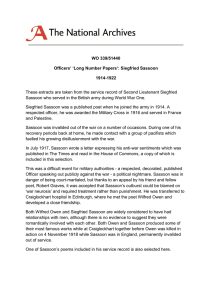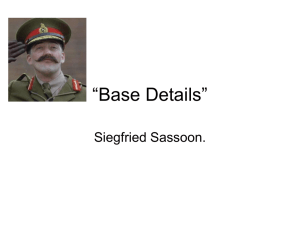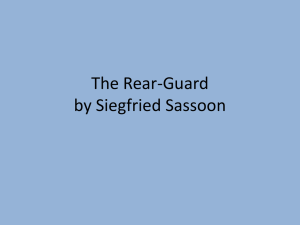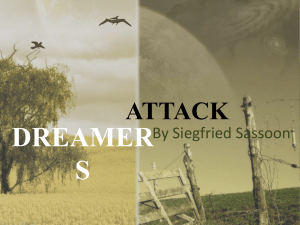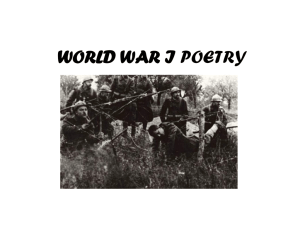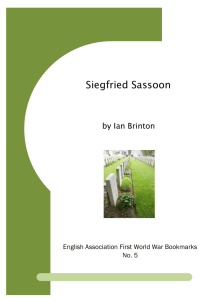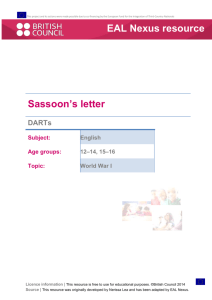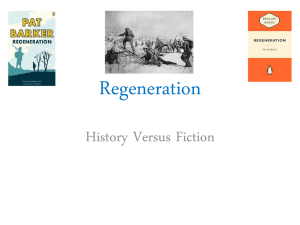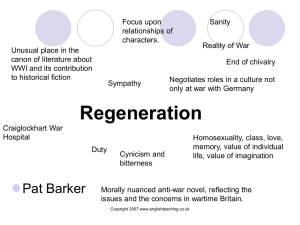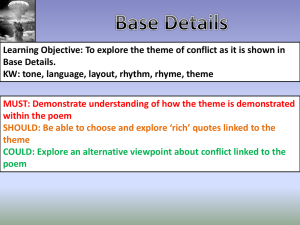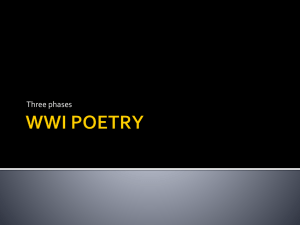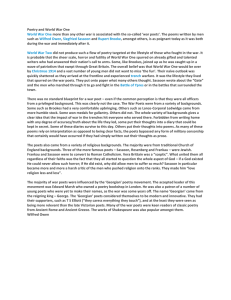Siegfried Sassoon
advertisement
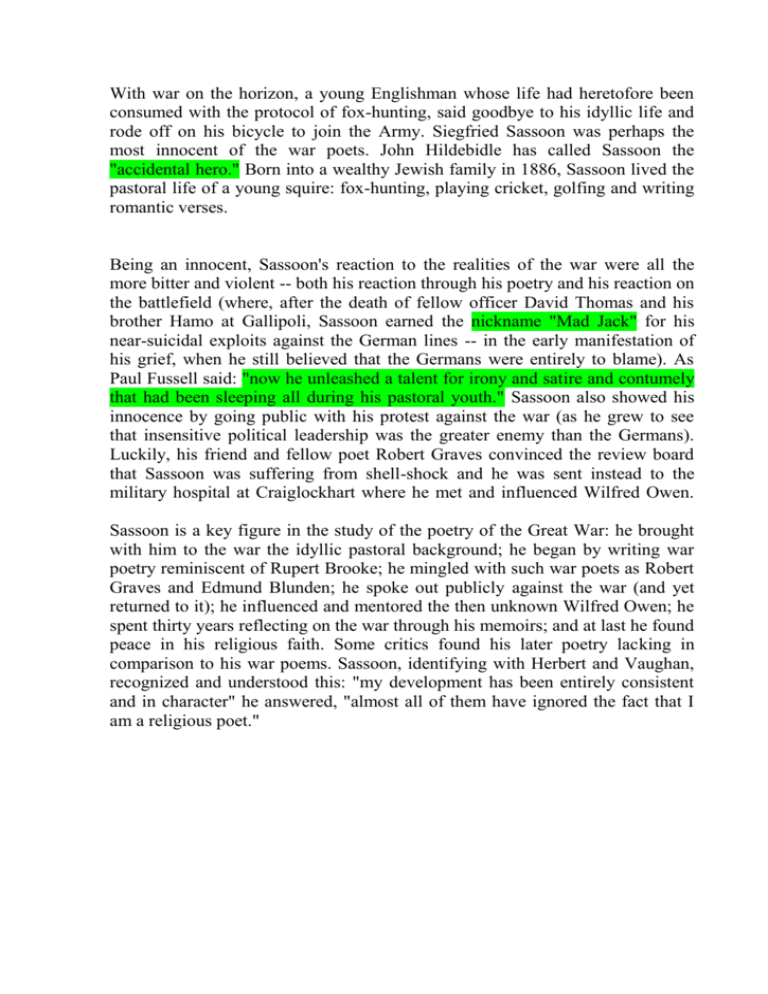
With war on the horizon, a young Englishman whose life had heretofore been consumed with the protocol of fox-hunting, said goodbye to his idyllic life and rode off on his bicycle to join the Army. Siegfried Sassoon was perhaps the most innocent of the war poets. John Hildebidle has called Sassoon the "accidental hero." Born into a wealthy Jewish family in 1886, Sassoon lived the pastoral life of a young squire: fox-hunting, playing cricket, golfing and writing romantic verses. Being an innocent, Sassoon's reaction to the realities of the war were all the more bitter and violent -- both his reaction through his poetry and his reaction on the battlefield (where, after the death of fellow officer David Thomas and his brother Hamo at Gallipoli, Sassoon earned the nickname "Mad Jack" for his near-suicidal exploits against the German lines -- in the early manifestation of his grief, when he still believed that the Germans were entirely to blame). As Paul Fussell said: "now he unleashed a talent for irony and satire and contumely that had been sleeping all during his pastoral youth." Sassoon also showed his innocence by going public with his protest against the war (as he grew to see that insensitive political leadership was the greater enemy than the Germans). Luckily, his friend and fellow poet Robert Graves convinced the review board that Sassoon was suffering from shell-shock and he was sent instead to the military hospital at Craiglockhart where he met and influenced Wilfred Owen. Sassoon is a key figure in the study of the poetry of the Great War: he brought with him to the war the idyllic pastoral background; he began by writing war poetry reminiscent of Rupert Brooke; he mingled with such war poets as Robert Graves and Edmund Blunden; he spoke out publicly against the war (and yet returned to it); he influenced and mentored the then unknown Wilfred Owen; he spent thirty years reflecting on the war through his memoirs; and at last he found peace in his religious faith. Some critics found his later poetry lacking in comparison to his war poems. Sassoon, identifying with Herbert and Vaughan, recognized and understood this: "my development has been entirely consistent and in character" he answered, "almost all of them have ignored the fact that I am a religious poet." War Poems by Seigfried Sassoon Glory of Women (Craiglockhart, 1917) You love us when we're heroes, home on leave, Or wounded in a mentionable place. You worship decorations; you believe That chivalry redeems the war's disgrace. You make us shells. You listen with delight, By tales of dirt and danger fondly thrilled. You crown our distant ardours while we fight, And mourn our laurelled memories when we're killed. You can't believe that British troops "retire" When hell's last horror breaks them, and they run, Trampling the terrible corpses - blind with blood. O German mother dreaming by the fire, While you are knitting socks to send your son His face is trodden deeper in the mud. Memory (Limerick, 1 February 1918) When I was young my heart and head were light, And I was gay and feckless as a colt Out in the fields, with morning in the may, Wind on the grass, wings in the orchard bloom. O thrilling sweet, my joy, when life was free And all the paths led on from hawthorn-time Across the carolling meadows into June. But now my heart is heavy-laden. I sit Burning my dreams away beside the fire: For death has made me wise and bitter and strong; And I am rich in all that I have lost. O starshine on the fields of long-ago, Bring me the darkness and the nightingale; Dim wealds of vanished summer, peace of home, and silence; and the faces of my friends. Remorse (Limerick, 4 February 1918) Lost in the swamp and welter of the pit, He flounders off the duck-boards; only he knows Each flash and spouting crash, - each instant lit When gloom reveals the streaming rain. He goes Heavily, blindly on. And, while he blunders, "Could anything be worse than this?" - he wonders, Remembering how he saw those Germans run, Screaming for mercy among the stumps of trees: Green-faced, they dodged and darted: there was one Livid with terror, clutching at his knees ... Our chaps were sticking 'em like pigs ... "O hell!" He thought - "there's things in war one dare not tell Poor father sitting safe at home, who reads Of dying heroes and their deathless deeds." Suicide in the Trenches (published in the Cambridge Magazine, 23 February 1918) I knew a simple soldier boy Who grinned at life in empty joy, Slept soundly through the lonesome dark, And whistled early with the lark. In winter trenches, cowed and glum With crumps and lice and lack of rum, He put a bullet through his brain. No one spoke of him again. You smug-faced crowds with kindling eye Who cheer when soldier lads march by, Sneak home and pray you'll never know The hell where youth and laughter go. Trench Duty (published in Counter Attack, 27 June 1918) Shaken from sleep, and numbed and scarce awake, Out in the trench with three hours' watch to take, I blunder through the splashing mirk; and then Hear the gruff muttering voices of the men Crouching in cabins candle-chinked with light. Hark! There's the big bombardment on our right Rumbling and bumping; and the dark's a glare Of flickering horror in the sectors where We raid the Bosche; men waiting, stiff and chilled, Or crawling on their bellies through the wire. "What? Stretcher-bearers wanted? Some one killed?" Five minutes ago I heard a sniper fire: Why did he do it? ... Starlight overhead Blank stars. I'm wide-awake; and some chap's dead. Reconciliation (November 1918) When you are standing at your hero's grave, Or near some homeless village where he died, Remember, through your heart's rekindling pride, The German soldiers who were loyal and brave. Men fought like brutes; and hideous things were done; And you have nourished hatred harsh and blind. But in that Golgotha perhaps you'll find The mothers of the men who killed your son. Memorial Tablet (November 1918) Squire nagged and bullied till I went to fight, (Under Lord Derby's scheme). I died in hell (They called it Passchendaele). My wound was slight, And I was hobbling back; and then a shell Burst slick upon the duck-boards; so I fell Into the bottomless mud, and lost the light. At sermon-time, while Squire is in his pew, He gives my gilded name a thoughtful stare; For, though low down upon the list, I'm there; "In proud and glorious memory" ... that's my due. Two bleeding years I fought in France, for Squire: I suffered anguish that he's never guessed. Once I came home on leave: and then went west ... What greater glory could a man desire? Aftermath (March 1919) Have you forgotten yet? ... For the world's events have rumbled on since those gagged days, Like traffic checked while at the crossing of city-ways: And the haunted gap in your mind has filled with thoughts that flow Like clouds in the lit heaven of life; and you're a man reprieved to go, Taking your peaceful share of Time, with joy to spare. But the past is just the same - and War's a bloody game ... Have you forgotten yet? ... Look down, and swear by the slain of the War that you'll never forget. Do you remember the dark months you held the sector at Mametz The nights you watched and wired and dug and piled sandbags on parapets? Do you remember the rats; and the stench of corpses rotting in front of the front-line trench And dawn coming, dirty-white, and chill with a hopeless rain? Do you ever stop and ask, "Is it all going to happen again?" Do you remember the hour of din before the attack And the anger, the blind compassion that seized and shook you As you peered at the doomed and haggard faces of your men? Do you remember the stretcher-cases lurching back With dying eyes and lolling heads - those ashen-grey Masks of the lads who once were keen and kind and gay? Have you forgotten yet? ... Look up, and swear by the green of the spring that you'll never forget. Siegfried Sassoon (1886 - 1967) Siegfried Sassoon, English writer of poetry and prose An English war poet, Sassoon was also known for his fictionalised autobiographies, praised for their evocation of English country life. Siegfried Sassoon was born on 8 September 1886 in Kent. His father was part of a Jewish merchant family, originally from Iran and India, and his mother part of the artistic Thorneycroft family. Sassoon studied at Cambridge University but left without a degree. He then lived the life of a country gentleman, hunting and playing cricket while also publishing small volumes of poetry. In May 1915, Sassoon was commissioned into the Royal Welsh Fusiliers and went to France. He impressed many with his bravery in the front line and was given the nickname 'Mad Jack' for his near-suicidal exploits. He was decorated twice. His brother Hamo was killed in November 1915 at Gallipoli. In the summer of 1916 Sassoon was sent to England to recover from fever. He went back to the front, but was wounded in April 1917 and returned home. Meetings with several prominent pacifists, including Bertrand Russell, had reinforced his growing disillusionment with the war and in June 1917 he published, in The Times, a letter in which he said that the war was being deliberately and unnecessarily prolonged by the government. As a decorated war hero and published poet, this caused public outrage. It was only his friend and fellow poet, Robert Graves, who prevented him from being court-martialled by convincing the authorities that Sassoon had shell-shock. He was sent to Craiglockhart War Hospital in Edinburgh for treatment. Here he met, and greatly influenced, Wilfred Owen. Both men returned to the front - Owen was killed in 1918. Sassoon was posted to Palestine and then returned to France, where he was again wounded, spending the remainder of the war in England. Many of his war poems were published in 'The Old Huntsman' (1917) and 'Counter-Attack' (1918). After the war Sassoon spent a brief period as literary editor of the Daily Herald before going to the United States, travelling the length and breadth of the country on a speaking tour. He then started writing the nearautobiographical novel 'Memoirs of a Fox-hunting Man' (1928). It was an immediate success, and was followed by others including 'Memoirs of an Infantry Officer' (1930) and 'Sherston's Progress' (1936). Sassoon had a number of homosexual affairs but in 1933 surprised many of his friends by marrying Hester Gatty. They had a son, George, but the marriage broke down after World War Two. He continued to write both prose and poetry. In 1957 he was received into the Catholic church. He died on 1 September 1967.
